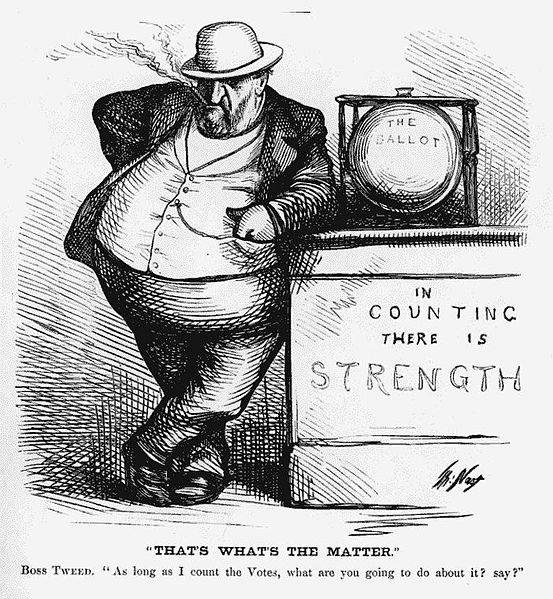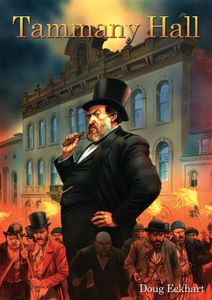 Formed in 1789, Tammany Hall was a New York City political organization that most closely aligned with Democratic ideals. In the early stages of its creation, it acted as a typical political organization. However, the 1850s rolled around, Tammany Hall became known for its corruption, fraud, scandals, and rigged elections under the rule of William Magear “Boss” Tweed from 1868 to 1871.
As increasingly large amounts of Irish immigrants migrated over to escape the potato famine in the 1850s, Tammany Hall saw a great opportunity to use these immigrants to their benefit. Since thousands of immigrants usually came to New York City with minimal resources, Tammany Hall provided them with most of the items that would allow them to settle down: shelter, employment, medical aid, and legal aid.
However, there was a catch: in order to receive the benefits for free, these immigrants would need to give their vote to Tweed. By taking advantage of the votes from these immigrants (who made up around 34% of New York City’s population), Tweed was able to control most elections.
In 1868, Tweed became a state senator and the grand sachem of Tammany Hall. Since he had a large amount of power by this point, he formed his own group called the “Tweed Ring”. Through using immigrants, the “Tweed Ring” was able to control all major elections, at which point they essentially had full jurisdiction over the state. In 1870, Tweed formed a board of audit, which allowed him to control the city’s treasury. He set up many schemes where he would launder thousands from the state, fake leases, and sell overpriced goods.
Formed in 1789, Tammany Hall was a New York City political organization that most closely aligned with Democratic ideals. In the early stages of its creation, it acted as a typical political organization. However, the 1850s rolled around, Tammany Hall became known for its corruption, fraud, scandals, and rigged elections under the rule of William Magear “Boss” Tweed from 1868 to 1871.
As increasingly large amounts of Irish immigrants migrated over to escape the potato famine in the 1850s, Tammany Hall saw a great opportunity to use these immigrants to their benefit. Since thousands of immigrants usually came to New York City with minimal resources, Tammany Hall provided them with most of the items that would allow them to settle down: shelter, employment, medical aid, and legal aid.
However, there was a catch: in order to receive the benefits for free, these immigrants would need to give their vote to Tweed. By taking advantage of the votes from these immigrants (who made up around 34% of New York City’s population), Tweed was able to control most elections.
In 1868, Tweed became a state senator and the grand sachem of Tammany Hall. Since he had a large amount of power by this point, he formed his own group called the “Tweed Ring”. Through using immigrants, the “Tweed Ring” was able to control all major elections, at which point they essentially had full jurisdiction over the state. In 1870, Tweed formed a board of audit, which allowed him to control the city’s treasury. He set up many schemes where he would launder thousands from the state, fake leases, and sell overpriced goods.
By having his friends in control of almost every aspect of the city, Tweed could get insider information on what new infrastructure projects were and when they would be implemented. Knowing this information, Tweed could plan accordingly and simply wait for the money to roll in. For example, if there was a new trolly line being built, Tweed would know the lines in advance, and could then buy all of the land along that line. When the trolley was actually built, the government would need to buy that land from him, which would allow him to earn thousands, if not millions, of dollars.
 Tweed’s glory didn’t last for too long, as he was found guilty of larceny and forgery in 1873. After escaping to Cuba and Spain, Tweed was extradited to the United States and ended up dying in a New York City jail in 1878.
Although there were many other instances of “bosses” controlling immigrants for votes, Tammany Hall under Tweed’s control was one of the most notorious and successful instances of machine politics. In fact, as of 2013, there is a board game called Tammany Hall, which casts the player in a similar role as Boss Tweed: earn political favors from immigrants by helping them move in, and then cashing them in on election day to earn big money.
Sources:
- https://allthatsinteresting.com/boss-tweed-tammany-hall
- https://www.thedailybeast.com/tammany-hall-the-game-where-you-play-as-a-new-york-city-ward-boss
- https://www.apstudynotes.org/us-history/topics/gilded-age-scandal-and-corruption/
Tweed’s glory didn’t last for too long, as he was found guilty of larceny and forgery in 1873. After escaping to Cuba and Spain, Tweed was extradited to the United States and ended up dying in a New York City jail in 1878.
Although there were many other instances of “bosses” controlling immigrants for votes, Tammany Hall under Tweed’s control was one of the most notorious and successful instances of machine politics. In fact, as of 2013, there is a board game called Tammany Hall, which casts the player in a similar role as Boss Tweed: earn political favors from immigrants by helping them move in, and then cashing them in on election day to earn big money.
Sources:
- https://allthatsinteresting.com/boss-tweed-tammany-hall
- https://www.thedailybeast.com/tammany-hall-the-game-where-you-play-as-a-new-york-city-ward-boss
- https://www.apstudynotes.org/us-history/topics/gilded-age-scandal-and-corruption/
I thought your post did a great job at explaining the corruption of political bosses. It made me wonder what reforms were passed to break their power. I found that the system began to decline by 1900 during the Progressive Era. Local governments replaced party patronage with civil service merit systems, so political bosses began to lose their control over government jobs. The federal government also developed social service and welfare institutions by the 1930s that undermined the importance of political bosses to those who sought support.
ReplyDeletehttp://autocww.colorado.edu/~toldy2/E64ContentFiles/PoliticsAndGovernment/PoliticalMachines.htm
Your post was very intriguing and informative to read! I really like how you went in a chronological order of events, and I had no idea that a Tammany Hall boardgame existed. When I read your post, I was reminded of the actions the Clintons took before and during the 2016 elections. Just like Tweed drained cities of their financial resources through "fake leases and sell overpriced goods," as you mentioned, the Clintons did so as well with their charity program. Before, when Hillary served as secretary of state, she was paid $22 million worth of speaking fees. Most of the revenue came from private interests and donors (so it clearly wasn't operated lawfully), and up until her election, the Clinton Foundation had raised $2 billion. According to some critics, the Clintons' operation was disguised as a charity, and was a method they used to take money from the rich to feed and maintain their lifestyle, as after Bill's presidency ended, Hillary said that they were "flat broke." I think it's quite interesting to compare these Tweed and the Clintons' methods of attaining their wealth, and it really shows how the corruption in the political system has continued until today.
ReplyDeleteSources:
http://www.northwestgeorgianews.com/rome/opinion/columns/they-saw-their-opportunities-and-took-them/article_584c750c-f1e3-11e9-9c5f-0fd4a14d88d5.html
https://www.usnews.com/news/articles/2016-04-22/heres-who-paid-hillary-clinton-22-million-in-speaking-fees
Your blog is very interesting because I remember in class, Mr. Stewart mentioned that most political bosses stayed out of the spotlight in order to keep their power and not get in trouble. It's interesting that Tweed was able to gain the notoriety that he did without getting in trouble. I also found it interesting that an alternate name for Tammany Hall was the Society of St. Tammany, which with its religious title would be good for attracting Irish-Catholic immigrants who did not fit into the protestant part of the ideal WASP American.
ReplyDeletehttps://untappedcities.com/2014/04/08/tammany-hall-today-a-site-of-higher-education-in-union-square/